Introduction
Financial health stands as the cornerstone of a business's longevity and success. It encompasses critical elements such as cash flow, profitability, asset management, and debt levels. A robust financial position not only empowers businesses to capitalize on growth opportunities but also provides resilience against economic fluctuations and ensures ongoing operational stability.
This article delves into the multifaceted nature of financial health, exploring its key components, the benefits of regular financial health checks, strategies for improvement, and the pivotal role of financial health consulting. Through insightful analysis and practical advice, it aims to equip CFOs and business leaders with the tools necessary to maintain and enhance their organizations' financial well-being.
Why Financial Health Matters for Businesses
Monetary well-being is an essential sign of an enterprise's overall viability and sustainability. It encompasses various aspects such as cash flow, profitability, asset management, and debt levels. A healthy economic position enables businesses to invest in growth opportunities, weather economic downturns, and maintain operational stability. Comprehending and tracking economic well-being guarantees that organizations can make knowledgeable choices that correspond with their strategic objectives.
A detailed economic report, including the balance sheet, income statement, and statement of cash flows, offers a clear perspective into an organization's operations. These reports enable stakeholders to assess both short-term and long-term assets and liabilities, net income, and overall economic health. For instance, the statement of cash flows captures all cash inflows and outflows, offering insights into whether a company relies on operational income or external financing. This is crucial for understanding operational efficiency and cash resource management.
Furthermore, the declaration of changes in equity, or the statement of retained earnings, offers insights into economic decisions that impact shareholder value. Budget reports also play a pivotal role by setting targets and comparing forecasts with actual data to gauge performance. These documents, governed by international accounting reporting standards and generally accepted accounting principles, ensure accuracy and transparency.
Recent news highlights the resilience of small enterprises amid economic shifts, with research showing an optimistic outlook for the coming year. This resilience demonstrates the significance of sustaining strong economic stability to adapt to evolving circumstances and capture growth possibilities.
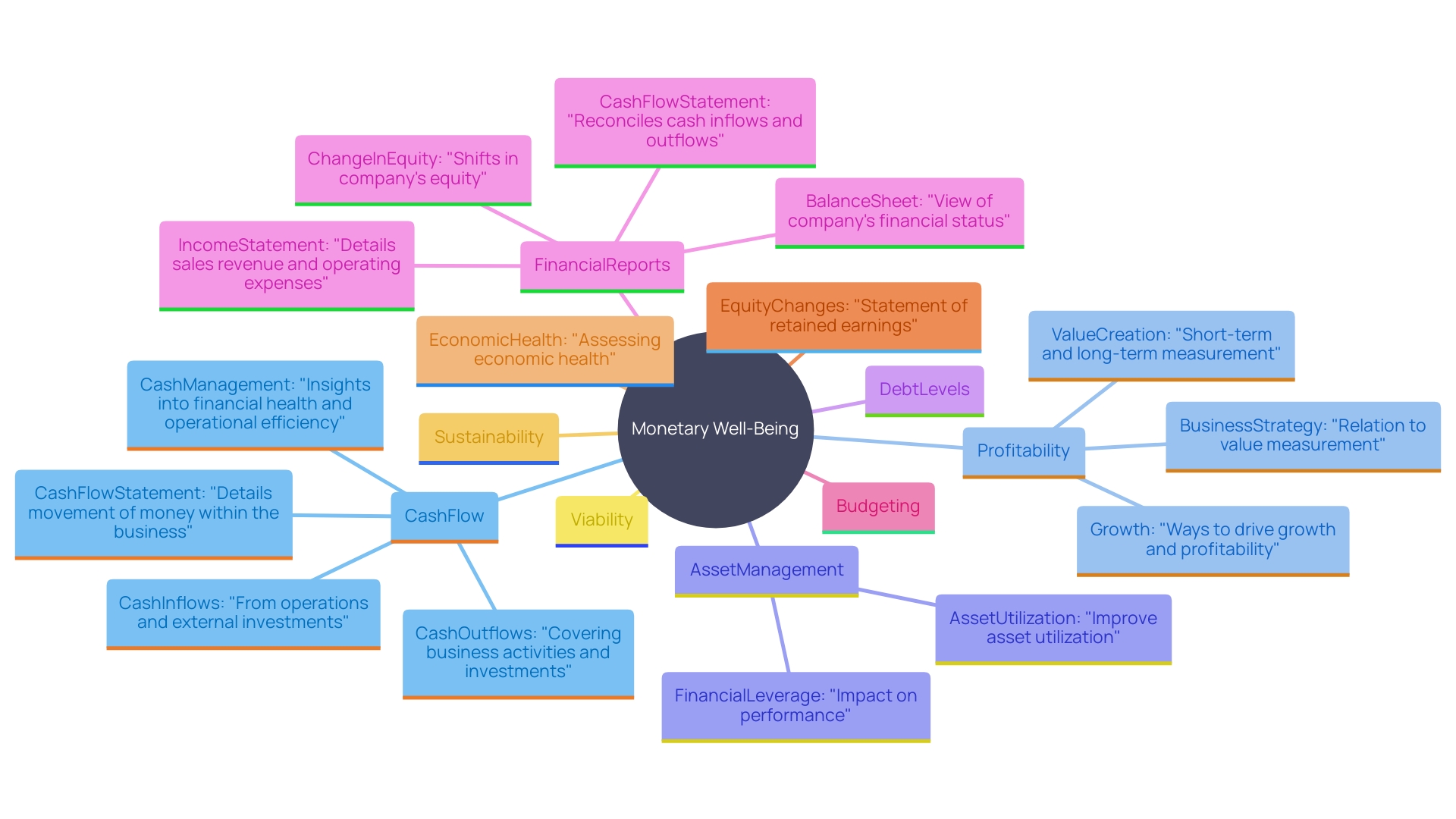
Key Components of Financial Health Analysis
A comprehensive financial health analysis encompasses several critical components that provide insights into various aspects of a business's financial performance.
- Liquidity Ratios: These ratios, such as the current ratio and quick ratio, assess an organization’s ability to meet short-term obligations. They assist in comprehending the organization's operational efficiency in managing working capital.
- Profitability Ratios: Metrics like the return on assets (ROA) and net profit margin measure an organization's efficiency in generating profits from its operations. They show how effectively an organization is utilizing its assets and managing its expenses. '- Solvency Ratios: These ratios, including the debt to equity ratio and interest coverage ratio, evaluate an organization's long-term financial stability.'. They provide insights into the organization's ability to sustain operations and grow without excessive reliance on debt.
- Operational Efficiency Metrics: These metrics, such as asset turnover and inventory turnover, highlight how effectively an organization is using its resources. They indicate the efficiency of the company's operations and its capability to convert investments into revenue.
By assessing these elements, companies can pinpoint economic strengths and weaknesses, compare with industry norms, and make knowledgeable choices to improve their fiscal well-being. Economic ratios serve as a decluttering instrument, extracting the most valuable information from monetary reports to guide significant organizational decisions and strategies.
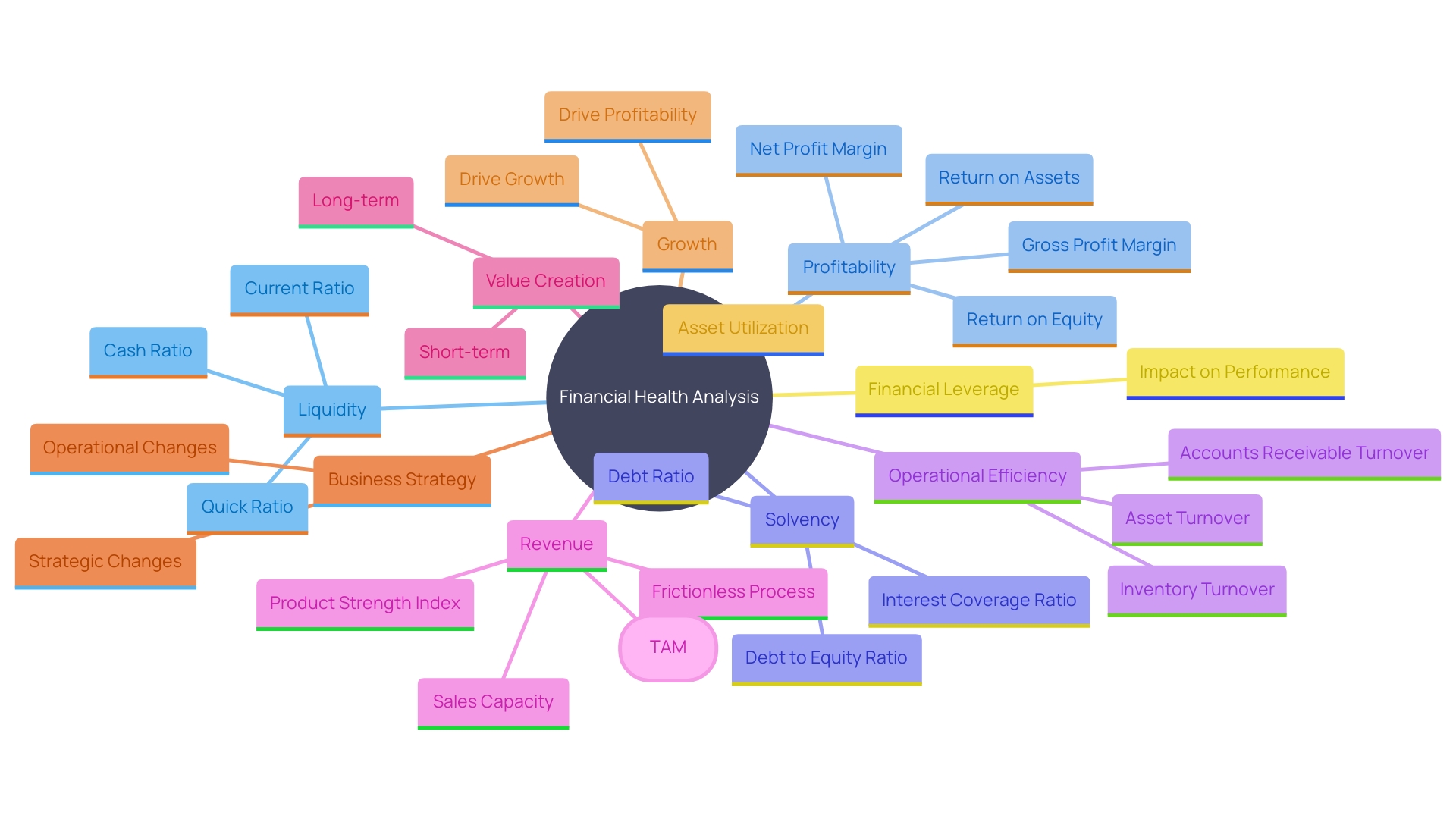
Benefits of Conducting Regular Financial Health Checks
Routine monetary assessments offer numerous advantages, particularly the prompt detection of possible problems, which is essential for ensuring economic stability. These assessments are pivotal in enhancing cash flow management—a significant challenge for many businesses, with 60% of small to medium-sized enterprises (SMEs) reporting ongoing difficulties. They often struggle with delayed invoicing, payments, and managing accounts receivable/payable.
Furthermore, fiscal evaluations aid in enhancing strategic planning by providing insights that can result in cost-saving actions and greater operational efficiency. For instance, implementing structured monetary models can enhance accuracy and reliability, making it easier to understand and adjust economic data, thereby aiding in effective risk management.
Comprehending and displaying a company’s economic status promotes improved connections with stakeholders, including investors and creditors. Transparent and sound monetary practices are not only essential for building trust but also for securing funding and investment. This transparency is further reinforced by the ability to present clear and accurate monetary statements, which are indispensable tools in decision-making processes.
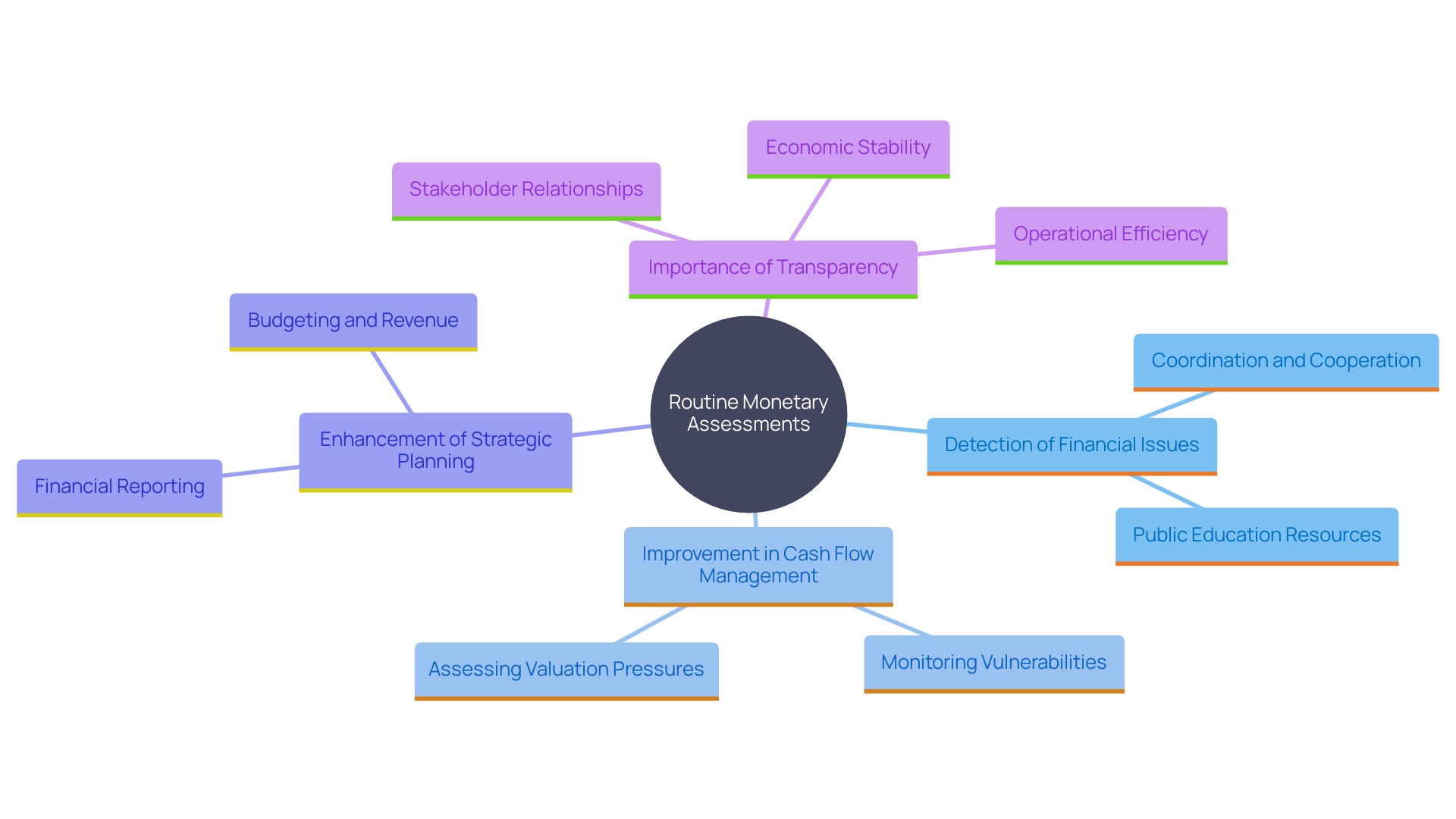
Strategies for Improving Financial Health
Improving economic health involves a multifaceted approach, starting with optimizing cash flow. Effective receivables management can significantly improve liquidity, ensuring that funds are available when needed. For instance, Nets, a provider of digital payment solutions, has streamlined its operations to better serve its clients across Europe, showcasing the impact of well-managed monetary processes.
Reducing unnecessary expenses is another crucial strategy. This can be accomplished through regular monetary assessments and cost-reduction strategies that do not compromise the core operations of the business. By focusing on eliminating redundant expenditures, companies can free up resources for strategic investments.
Refining pricing models is also essential. Adjusting prices to reflect market conditions and consumer behavior can enhance profitability. This approach requires a deep understanding of the market and the flexibility to adapt quickly to changes.
Investing in monetary technology offers substantial benefits, such as real-time insights and streamlined operations. The BFSI sector, for example, increasingly leverages Big Data technologies to manage massive volumes of data, improving decision-making, risk management, and operational efficiency. Predictive analytics, in particular, is becoming a critical tool for anticipating future trends and making informed decisions.
Frequently revisiting and adjusting monetary strategies in response to market changes is vital for sustained growth. The past year has shown how adaptable strategies can mitigate risks, as evidenced by the Federal Reserve's successful management of inflation without triggering the predicted recession. Remaining adaptable and reactive to economic changes guarantees long-term economic stability and growth.
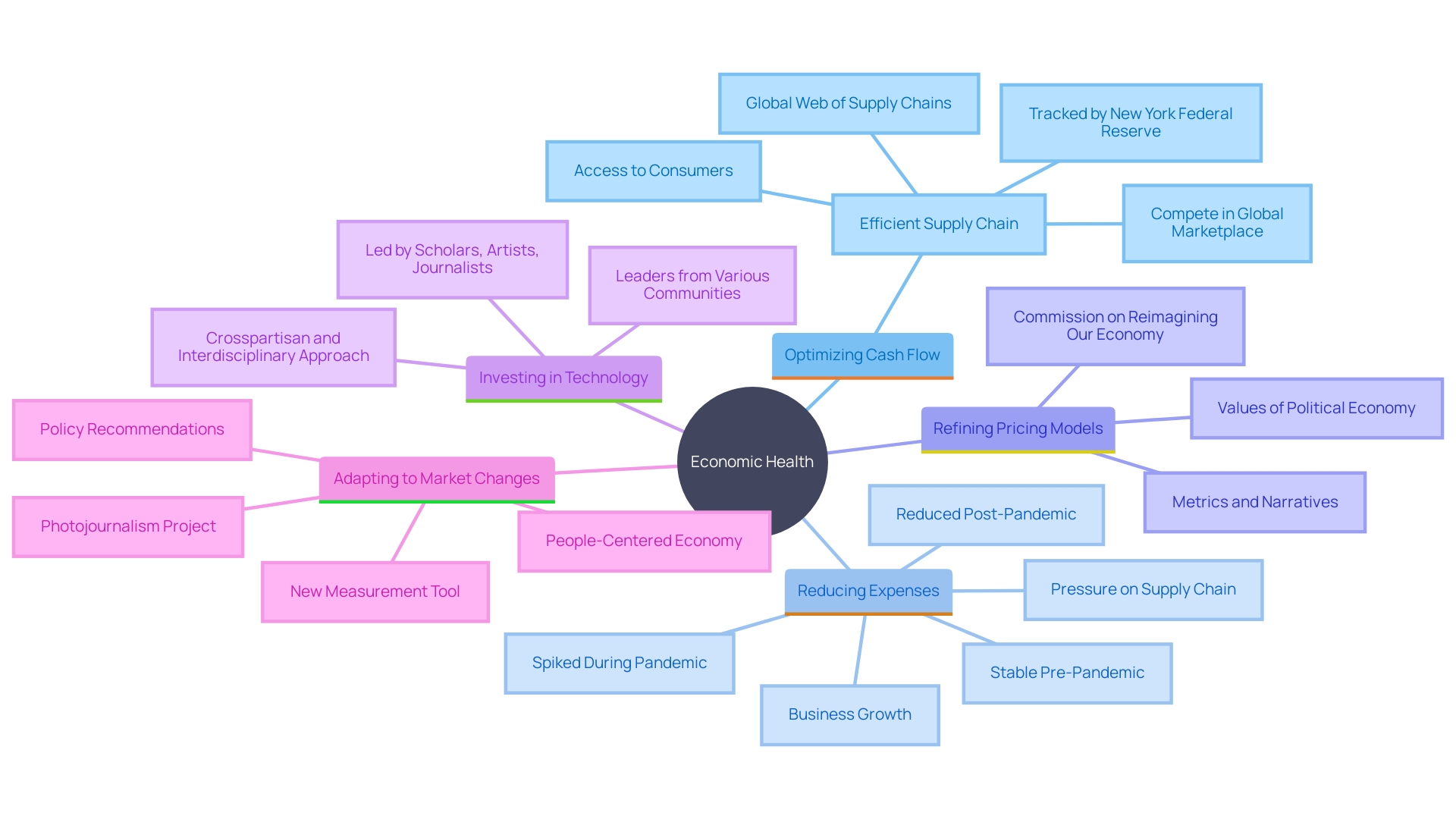
Role of Financial Health Consulting in Business Success
Wealth management consulting is essential in guiding businesses toward monetary stability and growth. Consultants serve as autonomous specialists who offer thorough assessments, tailored suggestions, and ongoing assistance, aiding organizations in navigating the complex economic landscape. Their expertise aids in formulating robust monetary strategies, ensuring compliance with ever-evolving regulations, and fostering a culture of fiscal accountability. A consultant's role can be likened to a coach, offering guidance on crucial areas such as sales strategies, marketing campaigns, project management, and information technology (IT). This comprehensive method guarantees that companies not only attain but maintain economic well-being and performance.
Case Studies: Successful Financial Health Consulting Practices
Numerous case studies illustrate the transformative impact of monetary health consulting on businesses across various sectors. One notable example involves a mid-sized manufacturing firm that faced significant cash flow constraints. By engaging a financial consultant who implemented a sophisticated cash flow forecasting model, the company achieved an impressive 30% improvement in liquidity. This case mirrors wider industry trends; a recent report disclosed that nearly 60% of organizations face ongoing difficulties in managing cash flow, often due to outdated manual processes. Modern forecasting tools are critical for overcoming these challenges.
Another success story comes from a retail company that underwent an operational audit. The audit identified inefficiencies, leading to a 25% reduction in overhead costs. Such operational reviews are crucial, as they offer extensive insights into resource distribution and possible cost-saving strategies, which are essential for sustaining economic stability. Performance reporting and management, including budget vs. actual reports, play a crucial role in these audits by helping businesses track and adjust their economic strategies effectively.
These examples emphasize the importance of economic health consulting. As mentioned by specialists, strategic actions in cash flow management and operational efficiency can result in significant enhancements in a company's economic stability and growth. Indeed, as the BFSI sector demonstrates, embracing advanced financial analytics and predictive tools is increasingly recognized as essential for navigating complex economic conditions and ensuring long-term success. The rise in digital transformation efforts, particularly in Cloud-based applications, further highlights the necessity for businesses to adapt and innovate continuously.
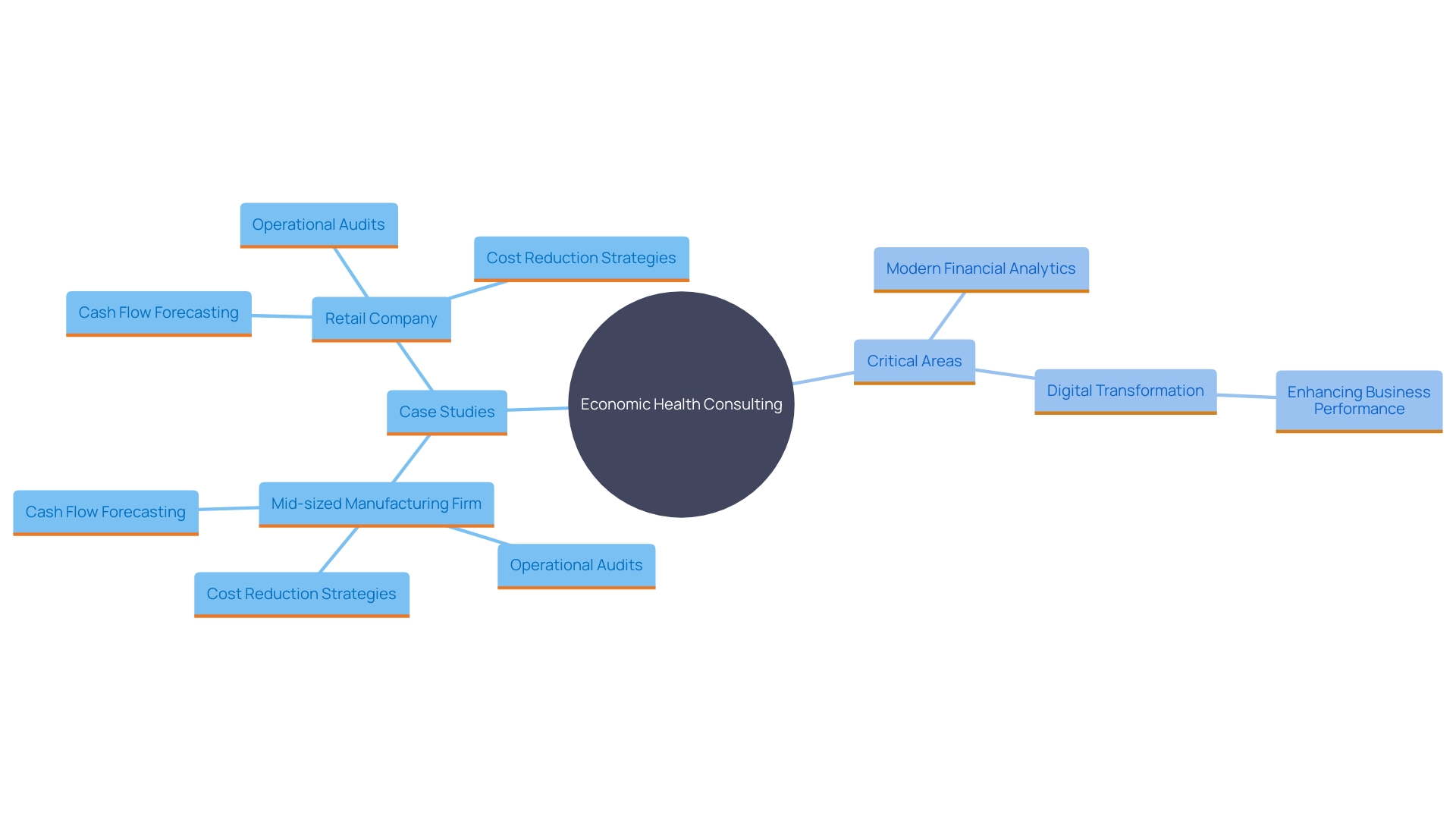
Conclusion
Financial health is integral to a business's sustainability and growth, impacting everything from cash flow to profitability. Regular assessments of financial health allow organizations to identify strengths and weaknesses, facilitating informed decision-making that aligns with strategic goals. The key components—liquidity, profitability, solvency, and operational efficiency—serve as benchmarks for evaluating performance and making necessary adjustments.
Conducting frequent financial health checks not only uncovers potential issues early but also enhances cash flow management and strategic planning. By fostering transparency in financial practices, businesses can strengthen relationships with stakeholders, securing the trust needed for funding and investment. Implementing structured financial models and refining pricing strategies further contribute to improved operational efficiency and profitability.
To bolster financial health, companies must adopt a multifaceted approach that includes optimizing cash flow, reducing unnecessary expenses, and investing in financial technology. Staying adaptable to market changes is crucial for long-term success, as evidenced by organizations that have successfully navigated economic fluctuations through agile strategies.
The role of financial health consulting cannot be overstated; consultants provide the expertise and guidance needed for sustainable financial practices. Their insights help businesses formulate robust strategies, ensuring compliance and fostering a culture of accountability. Case studies demonstrate the transformative impact of consulting, showcasing significant improvements in liquidity and cost reductions through targeted interventions.
In summary, prioritizing financial health is essential for any organization aiming for longevity and success. By leveraging regular assessments, implementing strategic improvements, and engaging financial consulting services, businesses can navigate challenges effectively and seize growth opportunities.




